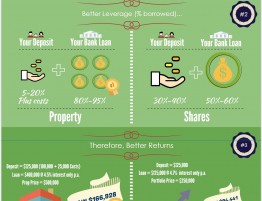
Capital Gains
Starting from basics, capital gains are increases in the value of assets. In real estate for example, if you buy an investment property for $400,000 including costs of purchase, and it increases in value over a few years to $500,000, your unrealized capital gain/ increase in equity is $100,000.
As long as you don’t sell your property or have a capital gain tax (CGT) event, you won’t be asked to pay taxes on your capital growth (please seek tax advice regarding CGT).
If you decide to sell this property, tax rules will apply and you will pay taxes on your gain after deducting certain costs and adding back certain items according to tax rules. If you hold your property for more than 12 months, you may be eligible for tax concessions as well. It is always advised to see your tax adviser before buying or selling your investment property.
The beauty of property is that as long as you don’t sell, you are virtually making a return upon return and deferring your tax until you sell. This is called the power of compounding.
If you need to use the gain for any reason, you can access the equity in the form of a loan to grow your investment portfolio or for any acceptable purpose.
Cash flows
An investment property can also deliver cash flows. These can be negative, (where you have to pay for expenses out of pocket after receiving your rental income), or positive (where you receive an income from rent even after all your expenses and interest have been paid).
There is a usual trade off between capital gains and cash flows. This means that a property that delivers outstanding capital gains, may not receive the best rental income yield due to the high property prices. The same as properties that deliver good positive cash flows don’t always have the best capital growth.
I tend to favor properties that will generate relatively good positive cash flows and have potential for growth at the same time. The reason behind this is that as an investor, I want to be able to grow my investment portfolio every year and I require income that will increase my borrowing capacity instead of negative cash flows which will eat away my income over time. Capital growth will also allow me to access equity in the future to buy more property.
I should mention that having positive cash flows does not necessarily mean that one is positively geared and has to pay more tax. If you structure your finances correctly, you may be able to be negatively geared for tax purposes due to depreciation allowances which don’t come from out of pocket but may decrease your tax payable.
Please speak to your mortgage broker, accountant and financial adviser to formulate the structure that is right for your particular circumstances.
Do not hesitate to contact me if you have any questions.
Was this post helpful? If so, leave a comment and share it with your friends and family.
With a grateful heart,
Juliana Ardila




